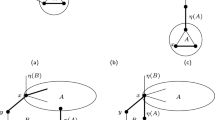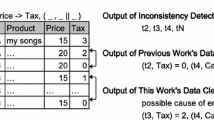Abstract
This paper considers two similar graph algorithms that work by repeatedly increasing “flow” along “augmenting paths”: the Ford- Fulkerson algorithm for the maximum flow problem and the Gale-Shapley algorithm for the stable allocation problem (a many-to-many generalization of the stable matching problem). Both algorithms clearly terminate when given integral input data. For real-valued input data, it was previously known that the Ford-Fulkerson algorithm runs in polynomial time if augmenting paths are chosen via breadth-first search, but that the algorithm might fail to terminate if augmenting paths are chosen in an arbitrary fashion. However, the performance of the Gale-Shapley algorithm on real-valued data was unresolved. Our main result shows that, in contrast to the Ford-Fulkerson algorithm, the Gale-Shapley algorithm always terminates in finite time on real-valued data. Although the Gale-Shapley algorithm may take exponential time in the worst case, it is a popular algorithm in practice due to its simplicity and the fact that it often runs very quickly (even in sublinear time) for many inputs encountered in practice. We also study the Ford-Fulkerson algorithm when augmenting paths are chosen via depth-first search, a common implementation in practice. We prove that, like breadth-first search, depth-first search also leads to finite termination (although not necessarily in polynomial time).
Preview
Unable to display preview. Download preview PDF.
Similar content being viewed by others
References
Baiou, M., Balinski, M.: Erratum: The stable allocation (or ordinal transportation) problem. Mathematics of Operations Research 27(4), 662–680 (2002)
Ford, L.R., Fulkerson, D.R.: Flows in Networks. Princeton University Press, Princeton (1962)
Gale, D., Shapley, L.S.: College admissions and the stability of marriage. American Mathematical Monthly 69(1), 9–14 (1962)
Gusfield, D., Irving, R.: The Stable Marriage Problem: Structure and Algorithms. MIT Press, Cambridge (1989)
Zwick, U.: The smallest networks on which the ford-fulkerson maximum flow procedure may fail to terminate. Theoretical Computer Science 148, 165–170 (1995)
Author information
Authors and Affiliations
Editor information
Editors and Affiliations
Rights and permissions
Copyright information
© 2006 Springer-Verlag Berlin Heidelberg
About this paper
Cite this paper
Dean, B.C., Goemans, M.X., Immorlica, N. (2006). Finite Termination of “Augmenting Path” Algorithms in the Presence of Irrational Problem Data. In: Azar, Y., Erlebach, T. (eds) Algorithms – ESA 2006. ESA 2006. Lecture Notes in Computer Science, vol 4168. Springer, Berlin, Heidelberg. https://doi.org/10.1007/11841036_26
Download citation
DOI: https://doi.org/10.1007/11841036_26
Publisher Name: Springer, Berlin, Heidelberg
Print ISBN: 978-3-540-38875-3
Online ISBN: 978-3-540-38876-0
eBook Packages: Computer ScienceComputer Science (R0)




